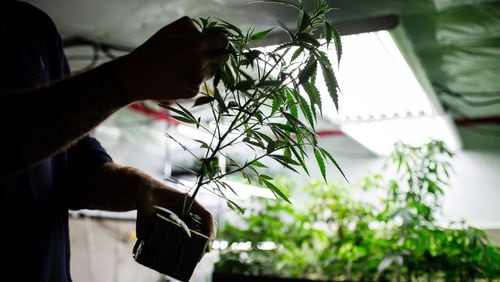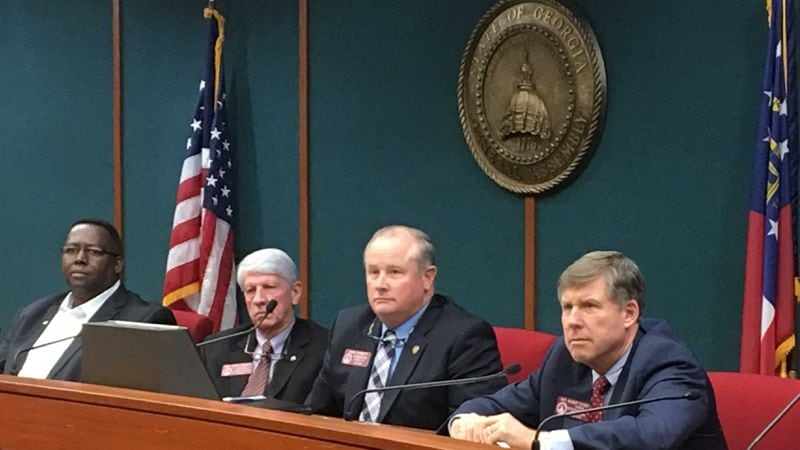Georgia lawmakers are recommending that the state government pass laws next year to allow hemp farming and cannabis oil distribution.
The proposals from two Republican-led committees would help provide medical marijuana to Georgia's 6,000 registered patients and give farmers another crop to support themselves.
Cultivation, manufacture and distribution of medical marijuana products will likely be considered by the Georgia General Assembly during its 2019 legislative session, which begins next month. Georgia has allowed patients to use medical marijuana since 2015, but state law still prohibits buying, selling or transporting it.
A House study committee voted unanimously last week to allow farming of hemp that could be processed into droplets, capsules and creams that are already widely available to the public in nutrition stores but imported to Georgia from other states. Cannabidiol — also called CBD — is legal in the United States if it contains less than 0.3 percent THC, the main psychoactive component of the cannabis plant.
A separate proposal from a joint House and Senate study committee would set up regulations for growing and selling a more potent cannabis product, low THC oil, which could be used by patients suffering from severe seizures, intractable pain, deadly cancer and other ailments. Georgia's medical marijuana law allows up to 5 percent THC, but it doesn't provide any legal way to obtain it.
Hemp growing in Georgia would allow the state to participate in an international market for cannabis oil, said Robert Lee, who started a Statham-based company called GaXtracts to manufacture industrial hemp into CBD product. Already, 41 states have some form of industrial hemp production under a federal pilot program.
“This is a massive step,” Lee said. “Georgia is primed and in a good position to get this legislation in place and enable the industry to start growing.”
Neither cannabis oil nor low THC medical marijuana gives users a high, but some state legislators remain concerned that expanding access to marijuana-related products could lead to recreational marijuana consumption.
"Hemp is cannabis. Cannabis is marijuana. Marijuana is a drug," state Rep. Dominic LaRiccia, a Republican from Douglas, told the House Study Committee on Industrial Hemp Production. "The most significant unintentional negative consequence in dealing with hemp is the likelihood of lessening or undervaluing what the drug of marijuana can or will do."
Congress is considering a farm bill that would legalize production of industrial hemp with less than 0.3 percent THC. The bill could receive a vote in Washington this week, and if signed into law, states such as Georgia could set up regulations for standards, testing and licensing fees.
"It's got the potential to be a big industry," said state Rep. John Corbett, a Republican from Lake Park and the study committee's chairman. "There might be years where hemp will give farmers an option to plant something that will generate income for them" besides corn, cotton, blueberries or soybeans.
As for medical marijuana oil, Georgia's program has expanded over the past three years, but patients need a way to legally obtain it, said state Rep. Micah Gravley, a Republican from Douglasville.
“Even some of the traditional opponents of marijuana know this has been good for the patients,” said Gravley, a co-chairman of the Joint Study Commission on Low THC Medical Oil Access. “We haven’t seen the sky fall. We haven’t seen any negative side effects. We’re seeing people that benefit, in some cases by coming off opioids.”
The commission is still deciding on details about how to ensure safe and controlled low THC oil distribution. Gravley said the group will likely make recommendations to the General Assembly before the end of the year.
Legislators need to consider how many licenses to award, what agency will handle oversight and how to ensure hemp products comply with state laws, said state Sen. Matt Brass, a Republican from Newnan.
“We have patients that this oil is working for,” said Brass, a co-chairman of the commission. “We’re tasked with trying to get that oil in their hands.”
Stay on top of what’s happening in Georgia government and politics at ajc.com/politics.
About the Author









